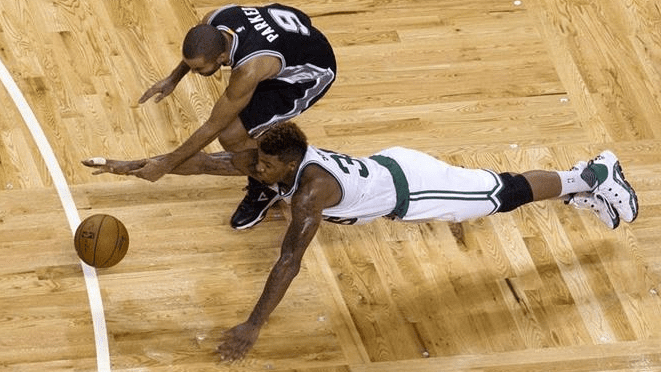In sports, there are physical standards and technical skills you must acquire to perform well. Ball handling in basketball, dribbling in soccer, speed in swimming–all tangible things that you work on with your coach. However, becoming a successful athlete (and teammate) requires much more than physical and technical performance.
Attitude, effort, and communication…these are the three intangibles that every athlete should bring to their sport. The beauty of these three things is that they require zero talent. The best players or the worst players on a team can exemplify these characteristics. These three intangibles are independent of: a bad call by a referee or umpire, a mistake made in a game, or someone else being better than you. Great athletes consistently bring these three things with them whenever they are practicing, playing, or training in the off season. There is no excuse for another player to have a better attitude than you, out work you, or out communicate you.
Attitude:
No matter what has gone on throughout the day or week, we can choose to bring a positive attitude to our sport. In turn, we can also choose to bring a negative attitude. The attitude that we bring is contagious. A positive attitude can sprout positivity throughout an entire team.
Our attitude can either inhibit our learning and growth…or it can foster it. Coaches around the country want players who come to practice and games ready to get better. It is hard to get better and have an open mind when we have a negative attitude.
Negativity fosters a shut off mind that is incapable of learning new information. Many times the negative attitude presents as: “why are we even practicing today?” “Haven’t we worked on this concept enough this year”? These mindsets delay the growth and development because players are questioning the process of getting better. A positive attitude presents as: “it is a great day to get better”. “How can I use today to sharpen my skills?”
Coaches understand that the daily grind of life can inhibit positive attitudes. However, players have to learn how to fake it until they make it. This idea is simple: put on a happy/neutral face and do not let anyone know that you are having a bad day. We can control our attitude even if we have to trick ourselves. “I GET to practice, train for, and play the game I love”. Instead, of “I HAVE to practice, train for, and play the game I love”. Bringing the right mindset into a practice or game makes a huge difference. If you are not going to practice with the right attitude, take this to heart. Try your best to fake it until you make it and play the game with a positive attitude.
Effort:
There is no excuse for anyone to outwork you on the practice field, in the weight room, or on game day. Derek Jeter said it best when he stated, “there may be people who have more talent than you, but there is no excuse for anyone to work harder than you do”. Every sport on the planet requires effort. The hardest worker does not always win; but they usually give themselves a chance to stay in the game.
Coaches love effort. They love seeing their players go the extra mile for the team. Effort requires zero talent. In order for talent to improve…players must bring forth effort.
For instance, a sprinter who goes 70% effort in practice will only have 70% of the results. This is the same in any sport; in order to unlock your full potential you have to train at 100%. You never know what your opponent is doing to get better. The worst feeling in the world is getting beat and knowing that it was because of lack of effort in training/practice. Practice and training are designed to give you the confidence to know that you have done everything possible to get better. If you have given 100% effort in training and practice and still end up taking a loss…tip your cap.
Our goal as athletes is to not have the opponent beat us. We do not want to have the tough reality that we beat ourselves. If you are reading this and have been convicted that you are not giving 100% effort day in and day out, fix it. You cannot fix the past; but you can definitely fix the here and now. Your effort is something you can control each and every day. Take control of the effort you put forth and leave everything out on the field at practice, and in games.
Communication:
Communication should be something we bring with us on a daily basis in: practice and in games. Once again, this is something that involves zero talent. Every sport requires some sort of communication. Baseball players call for the ball on a pop fly, basketball players call out screens for their teammates. No matter what sport you play, it is vital to communicate well with your teammates and coaches.
Communication goes well beyond talking about your specific sport. For instance, if you run into traffic on the way to practice and you think you may be late, call or text your coach. It is a really simple example, however, it is something that can be used in a real life scenario. Your coach will appreciate the two seconds that it took to give them a heads up about your tardiness.
Another aspect of communication is conflict resolution. There will be a time when playing time or a conflict with a teammate will arise. What is the best way to handle that situation? Will you yell and scream at your coach/teammate? Will you have mom and dad intervene? Many times, there is a right way to approach the situation and a wrong way. Most times, the wrong way involves pointing the finger and yelling at another individual. This type of communication evokes a negative reaction from the coach or teammate. This negative reaction can exacerbate the conflict and cause more harm than good.
At times, the best communication may come in the form of saying nothing. This gives you the chance to calm down and think about what you really want to say. Many programs have developed a 24-hour rule to ensure that each party has the chance to think before they act. This rule does a great job of preventing people from saying/doing things that they will regret. If you are reading this and feel that you have not been communicating effectively…work on it. Communication is something that takes practice. Work on taking a second to listen to your coach/teammate before you speak. Improve on sending a text/calling when you are running late. Coaches love players that are vocal and communicate well with others.
As you can see, attitude, effort and communication are vital in sports. These three things are so important, yet they require zero talent. You can influence your team’s success by putting these concepts into practice. Be the player that strives to bring their best attitude, give their best effort, and communicate flawlessly. When you make the commitment to infuse these intangibles, your teammates and coaches will notice the change. You will also notice positive changes in your performance by ingraining these principles day by day. Strive to be the player that loves being at practice/games. Strive to be the player that outworks everyone. Strive to be the player that communicates the best. Be the best player in your program by instilling these intangibles into your daily routine. The sky is the limit for a player that brings quality attitude, effort, and communication to the table each and every day.
CoachUp is the safest and easiest way to find a coach for personalized training. With our 100% money-back guarantee and vetted coaches, anyone can achieve their full athletic potential. Find your perfect coach today and become the athlete you want to be!
How useful was this post?
Click on a star to rate it!
Average rating 4.8 / 5. Vote count: 11
No votes so far! Be the first to rate this post.




One Response
Thank you for having the time and effort on sharing this amazing blog with us! I’ll probably read more of your articles.